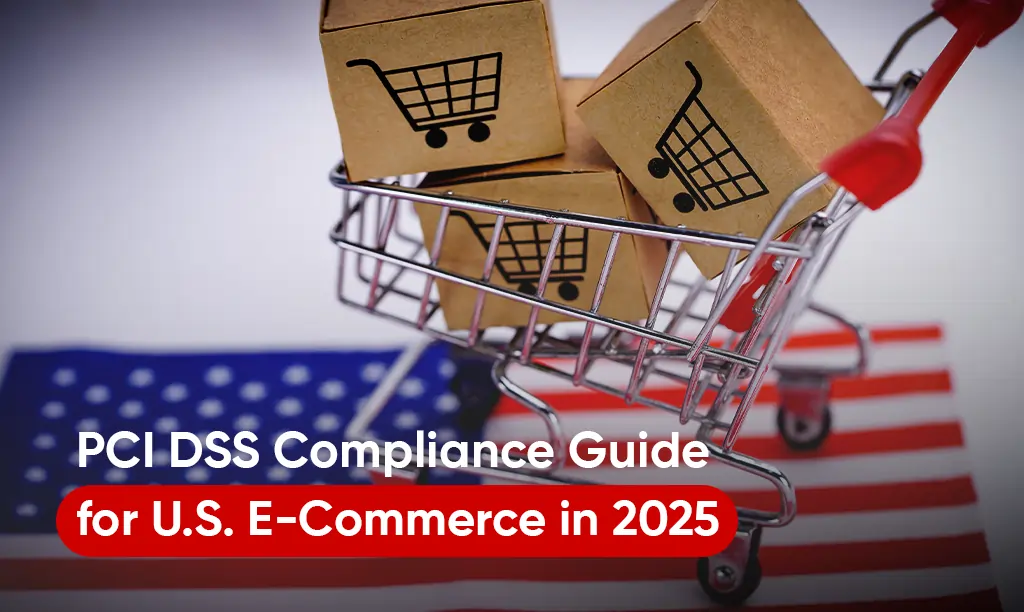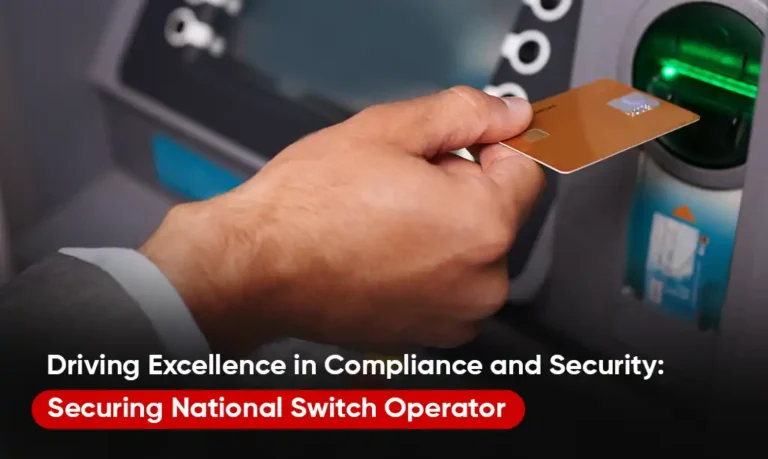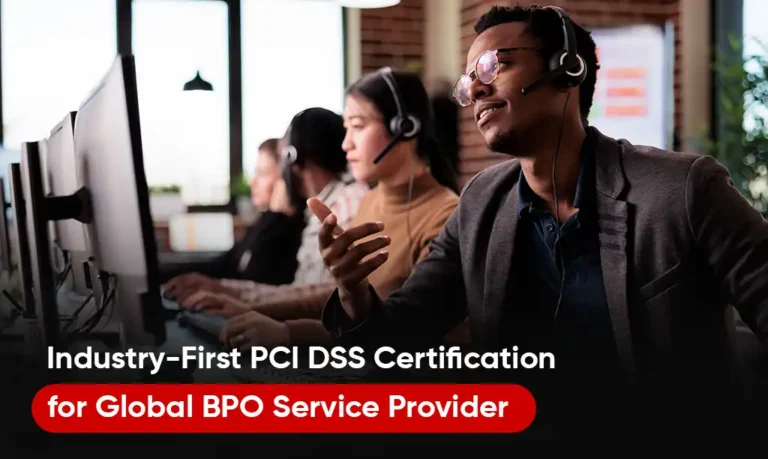The Payment Card Industry Data Security Standard (PCI DSS) remains a cornerstone for securing payment card data. For U.S. based eCommerce businesses, compliance is more than a regulatory obligation; it is an essential strategy to protect customer trust, avoid financial risks, and maintain a competitive edge in the increasingly digital marketplace. With technological advancements and evolving cybersecurity threats, staying PCI compliant has never been more important.
This guide breaks down the complexities of PCI DSS compliance, offering practical strategies and insights for U.S. eCommerce businesses and online merchants in 2025.
What Online Merchants Should Know About PCI DSS Compliance
PCI DSS was established by major credit card brands to ensure businesses processing card payments meet specific security standards. Whether you’re a small business processing a few transactions or a large enterprise handling millions annually, PCI compliance protects payment information from breaches and fraud.
Compliance includes safeguarding payment card data through measures such as encryption, secure networks, and monitoring access. Failing to comply not only risks permanently damage customer trust but also incurs penalties, such as fines or even termination of merchant accounts.
Furthermore, PCI DSS certification positions businesses to tackle the increasing sophistication of cyber threats targeting eCommerce platforms.
Why Payment Security Matters for U.S. eCommerce Businesses
2025 U.S. online retail sales are projected to exceed $1.5 trillion. This growth also attracts sophisticated cybercriminals targeting payment systems. According to IBM’s Cost of a Data Breach Report 2024, the average cost of a data breach reached $4.88 million – a 10% increase over last year and the highest total ever. For eCommerce businesses, secure payment systems aren’t optional – they are the bedrock of operations.
In the U.S., compliance with PCI DSS often intersects with laws like the California Consumer Privacy Act (CCPA). This means merchants who comply with PCI DSS are better positioned to meet broader legal requirements. Additionally, with U.S. consumers increasingly wary of sharing financial data online, PCI DSS compliance is a competitive advantage by demonstrating a commitment to protecting sensitive payment data.
Payment security directly impacts business reputation and customer loyalty. Customers are more likely to shop with the merchants they perceive as secure, which is a major differentiator in the crowded eCommerce landscape.
Understanding PCI DSS Level
PCI DSS Standard consists of 6 key control objectives, broken down into 12 specific requirements. These range from maintaining secure networks and encrypting cardholder data to regularly monitoring and testing networks. The aim is to ensure the security of every aspect of payment card data processing, storage, and transmission.
PCI Compliance levels depend on annual transaction volume:
- Level 1: Over 6 million transactions annually.
- Level 2: 1 to 6 million transactions annually.
- Level 3: 20,000 to 1 million transactions annually.
- Level 4: Fewer than 20,000 transactions annually.
For U.S. eCommerce owners, knowing your compliance level determines the scope and type of validation required, such as whether you’ll need annual audits by a Qualified Security Assessor (QSA) or PCI Self-Assessment Questionnaire (PCI SAQ) is required.
Is PCI DSS Compliance Mandatory for E-Commerce Websites?
Yes, PCI DSS compliance is mandatory for any business that accepts, stores, and/or transmits card data, regardless of size or industry. For U.S. based businesses, compliance is often enforced through contracts with payment processors. Non-compliance could result in penalties ranging from $5,000 to $100,000 per month depending on the various factors and potentially being barred from processing card payments.
PCI DSS Compliance Impact on E-Commerce Platforms
PCI DSS compliance affects three critical layers of an eCommerce platform:
- Technical Systems: Ensures firewalls, encryption protocols, and secure payment gateways are in place.
- Customer Experience: Builds trust by securing customer data and reducing friction in checkout processes.
- Operational Processes: Regular monitoring, employee training, and security testing are required to keep systems compliant.
U.S. eCommerce enabler platforms like Shopify and BigCommerce offer built-in tools and features to help merchants achieve and maintain PCI compliance.
Risks and Consequences of PCI Non-Compliance
Financial and Operational Risks:
- Financial Risks: Fines can range from $5,000 to $100,000 monthly.
- Operational Risks: Payment processors may suspend services for non-PCI compliance.
- Legal Risks: U.S. data protection laws like CCPA amplify the repercussions of breaches.
Case Studies: Impact on U.S. Businesses Due to Non-PCI Compliance
- In 2013, Target’s breach of 40 million cardholder accounts resulted in close to $292 million in settlements, covering all the fines, penalties, legal fees, and costs related to the breach.
- Home Depot experienced a data breach in 2014 that compromised estimating 50 million credit card data, resulting in approx. US$19.5 million settlement.
- In 2019, North Country Business Products (NCBP), a Minnesota-based provider of point-of-sale products, experienced a data breach that compromised customer payment information across 139 restaurants. The breach was attributed to vulnerabilities in their systems, highlighting the critical need for robust security measures.
- In May 2020, Neiman Marcus Group, a luxury department store chain, suffered a data breach affecting approximately 4.6 million customers. The incident involved unauthorized access to payment cards and virtual gift card information, underscoring the severe repercussions of inadequate data security practices.
These cases emphasize the importance of adhering to PCI DSS standards to protect sensitive payment information and maintain customer trust. Smaller businesses, with fewer resources to recover, are especially vulnerable to shutting down even after a small data breach.
How to Keep Up with PCI DSS in 2025
As PCI DSS v4.0 got retired on 31 December 2024, v4.0.1 will be the only active version. Key update focuses on flexibility and risk-based approaches. The updated framework emphasizes on:
- Customized Controls: Businesses can implement alternative security measures tailored to their environment and risk profiles.
- Stronger Authentication Requirements: Enhanced password protocols and mandatory multi-factor authentication (MFA).
- Clarified Testing Guidance: Simplifies how businesses validate compliance.
- Continuous monitoring: Encourages real-time tracking of security measures.
Steps to Ensure PCI Compliance
- Conduct a Risk Assessment: Map out your cardholder data environment (CDE).
- Work with Experts: Engage a PCI QSA or compliance specialist to guide your compliance journey and efforts.
- Leverage Compliant Payment Processors: Work with platforms like PayPal, Stripe, or Authorize.net, which handle much of the compliance burden.
- Train Employees: Regularly educate and train your staff on data security protocols.
Common Challenges in Protecting Financial Data
- Third-Party Integrations: Ensure third-party vendors adhere to PCI DSS standards.
- Client-Side Security: Browser-based attacks like form jacking, SQL injection, XSS, etc. remain a significant threat; ensure your mobile app and website have mitigated the vulnerability.
- Resource Constraints: Small businesses often lack in-house expertise or funds to manage compliance
Ampcus Cyber’s Role in PCI Compliance for U.S. eCommerce
Ampcus Cyber provides end-to-end PCI DSS solutions, including compliance audits, risk assessments, security audits, and employee training, and advanced security tools tailored to eCommerce businesses. With deep expertise in securing multiple eCommerce merchants across the globe, we ensure your business achieves and maintains compliance efficiently and aligns with the latest standards.
Conclusion
PCI DSS compliance is essential and an ongoing journey for U.S. eCommerce businesses aiming to secure payment data and build customer trust in 2025. By adopting advanced security measures, staying proactive, and leveraging expert guidance, merchants can thrive in an increasingly competitive and digital landscape
| Begin your PCI DSS compliance journey to protect your customers and confidently secure your e-commerce future in 2025. |
Enjoyed reading this blog? Stay updated with our latest exclusive content by following us on Twitter and LinkedIn.













